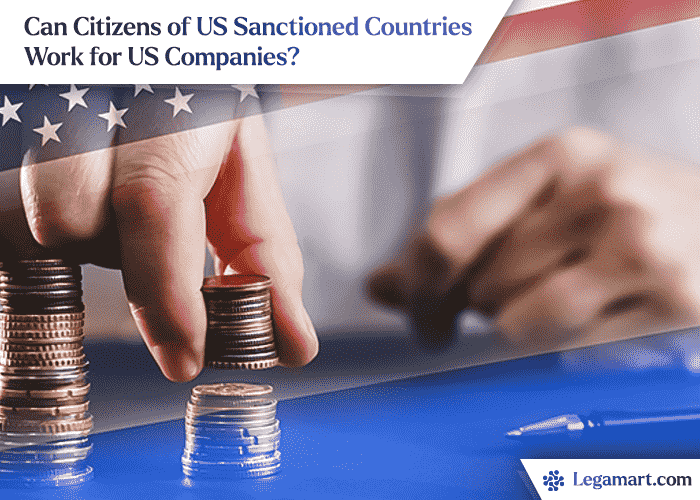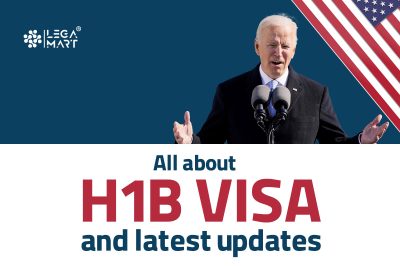“Most people worldwide want to work at a US-based company. But have you thought about the legal requirements of the US sanction laws? What if you belong to a US sanctioned countries? The US sanction laws impose restrictions on certain countries, which you should be aware of if you are a citizen of that particular country and want to be involved in any activity with the US”.
Introduction
Let’s take an example of Iran, which is under the list of US sanctioned countries. Suppose you’re a citizen of Iran and want to work with a US company. You need to know that the US government doesn’t allow any financial transactions with anyone, whether an individual or a company of a US sanctioned country. So, even if you work for a US company, the company cannot pay you since US law prohibits it.
To briefly understand the meaning of sanction, we can say that sanctions are a kind of punishment put by a country or a group of countries upon another.
What are the Applications and Purpose of the US sanction?
The US sanctions are rules and laws imposed by the US government that prohibit US citizens from conducting business with the US sanctioned country.
The US sanctions regime is controlled and governed by the OFAC (Office of Foreign Assets Control) of the US Department of Treasury. It mainly manages and controls the economic sanctions programs.
The foremost aim of such legal requirements is to achieve foreign policy goals, national security, or other policies of the United States by prohibiting trade and assets.
What is the SDN List?
The SDN list contains the list of individuals or entities that are sanctioned by the US. The full form of SDN is OFAC’s Specially Designated Nationals and Blocked persons.
What are the Effects of the SDN List?
The OFAC doesn’t permit any transaction between the SDN-listed entities and non-sanctioned entities if any particular transaction holds a connection with the US jurisdiction.
The OFAC bans and blocks all the interests and property of SDN-listed entities that fall under the US jurisdiction or have a connection with the US jurisdiction.
Suppose a non-sanctioned individual or entity is involved in a transaction with the US Sanctioned country or individual or entity that results in the breach of US laws. In that case, there are high chances that the default entity or individual will be sanctioned and added to the SDN list.
Who does the US Sanction Apply to?
The US doesn’t apply sanctions just to any country. It only applies to countries that are contrary to the US policies, promote terrorism, or violate the human rights of their country’s people. However, it depends upon the US to whom to sanction. It can sanction the whole country, an individual, or an entity of that nation.
As per the updated list of March 2022, the US sanctions the following countries:
- Afghanistan
- Belarus
- Burma
- Cuba
- The Central African Republic
- Democratic Republic of Congo
- Ethiopia
- Hong Kong
- Iran
- Iraq
- Libya
- Lebanon
- Mali
- Nicaragua
- North Korea
- Russia
- Somalia
- Sudan
- South Sudan
- Syria
- Ukraine
- Venezuela
- Yemen
- Zimbabwe
What are the Restricted Activities of US Sanctions?
The scope of restricted activities of US sanctions depends upon the sanction programs under which the individual, entity, or nation is sanctioned.
For instance, the transaction between the US sanctioned country and the non-sanctioned party is strictly forbidden. However, if the US person tries to make transactions through a non-US person to the US sanctioned country, it would also be considered a breach of law.
The other restricted activities include imports and exports of goods, financial transactions, transfer of technology, and any donations.
What are the Types of Sanctions?
There are mainly two types of sanctions: Primary sanctions and secondary sanctions.
Primary Sanctions
Usually, primary sanctions apply to the financial transactions or the entities or individuals which involve a connection to the US jurisdiction. Primary sanctions include:
- All the US-based entities
- All the US permanent residents and citizens.
- All the person physically lives in the US (irrespective of his nationality).
- All the US incorporated companies and their branches situated in foreign countries, and
- Financial transactions through the US financial system.
Regardless of the facts mentioned above, if a transaction doesn’t have a connection to the US jurisdiction and primary sanction is imposed upon the said SDN-listed entity or individual, then the non-sanctioned entity can engage in transactions with the US sanctioned entity. Therefore, it is important to determine whether the transaction has any connection with the US jurisdiction.
Secondary Sanctions
Unlike the primary sanctions, the secondary sanctions don’t need a connection to the US jurisdiction because it applies to the non-US persons directly or indirectly involved in activities or transactions with the US sanctioned countries such as Iran, Syria, or North Korea.
What are the Steps to be Taken when Sanctions are Imposed?
If in case you or the other party is subject to the US sanctions, you should know the necessary steps, which are categorized as follows:
If you’re a newly US sanctioned country
- It is advisable to immediately bring the restricted activities to an end once the sanctions are applied. If the activity cannot cease immediately, then OFAC will provide a grace period within which you’re supposed to discontinue the activities.
- The newly sanctioned party can request OFAC for a temporary license, allowing the party to continue with the authorized activities for a specific time.
If you’re a party who is in contract with the newly sanctioned country
- If the contract includes services to the US sanctioned party subject to the sanctions, it should be terminated as soon as possible.
- If services are being provided under terminated contracts, they should cease immediately.
- If there are any continuing obligations at law that don’t necessarily cease to exist, then the parties must be aware of the continuing obligations.
- The parties must inform the OFAC about every single step taken by them following the application of sanctions.
What is the Application of US Sanctions Laws to Non-U.S. Person/Parties?
Generally, the US sanction laws only apply to persons subject to primary sanctions. However, sometimes the US sanctions can apply to non-US persons/parties and companies.
Four US principles categorize the circumstances in which non-US persons can be subject to US sanctions:
- When the Non-US person/party has a high level of contact with the United States, it can be subject to US sanctions.
- When the Non-US person/party allotted itself as an SDN-listed party.
- When secondary sanctions are applied(specifically deals with the Non-US persons/parties).
- When the Non-US person/party is providing materials or assistance to the parties subject to US sanctions.
Conclusion
Based on the above discussions, we can conclude that citizens of US sanctioned countries might find it challenging to work in a US company because US citizens are prohibited from engaging in financial transactions with them. In some cases, General licenses can act as an exception to the rule, but almost all transactions are generally prohibited. Even if the party has been US sanctioned recently, it is essential to follow the US sanction laws to avoid legal consequences.
Uncover the steps and procedures for immigration to different nations, with a focus on Turkey to Norway and US to Portugal, in Legamart’s insightful articles.




